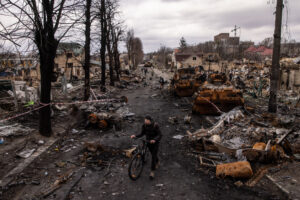In a world where events change rapidly, staying informed about the most significant news is crucial. From geopolitical shifts to economic tremors and natural disasters, here’s a roundup of the most important stories that are shaping the global landscape right now.
1. Geopolitical Tensions in the Middle East: Israel-Palestine Conflict Escalates
The Israel-Palestine conflict, one of the world’s most enduring and contentious issues, has seen renewed violence. In recent months, tensions in the Gaza Strip and the West Bank have escalated, with numerous rocket attacks and retaliatory airstrikes. The core issues, including territorial disputes, the status of Jerusalem, and the right of return for Palestinian refugees, remain unresolved despite ongoing international mediation efforts.
The situation has drawn global attention, with the United Nations calling for immediate de-escalation and peace talks. Neighboring countries like Egypt and Jordan have tried to mediate, but the cycle of violence persists. The humanitarian impact on civilians, particularly in Gaza, has been severe, with homes destroyed and critical infrastructure severely damaged. The international community continues to grapple with finding a long-term solution to the conflict, one that addresses the political, social, and security concerns of both Israelis and Palestinians.
2. Economic Crisis in Argentina: Inflation Hits Record Highs

Argentina is facing one of the most severe economic crises in its history, with inflation rates soaring to unprecedented levels. The country has been grappling with economic instability for years, but the current situation is particularly dire. Inflation has exceeded 100%, dramatically increasing the cost of living. Many Argentinians are struggling to afford basic necessities such as food, fuel, and medicine.
The Argentine peso has plummeted in value, further exacerbating the financial strain on ordinary citizens. In response, the government has implemented strict currency controls and raised interest rates, but these measures have done little to stabilize the economy. The International Monetary Fund (IMF) has been involved in negotiations with Argentina, but the path to recovery remains uncertain. This economic turmoil has sparked protests across the country, with citizens demanding effective government action to address the crisis.
3. Climate Change Intensifies: Global Heatwaves and Extreme Weather
Climate change continues to dominate the global news cycle as extreme weather events wreak havoc around the world. In the past few months, several regions have experienced unprecedented heatwaves, droughts, floods, and wildfires, highlighting the accelerating impacts of global warming. In Europe, countries like Spain, Italy, and Greece saw record-high temperatures, while large parts of the United States, including California and Texas, battled devastating wildfires and drought conditions.
The consequences of these extreme weather events have been catastrophic, both in terms of human lives and economic costs. In Asia, flash floods in Pakistan and India have displaced millions of people, while sub-Saharan Africa faces recurring droughts that threaten food security. Scientists warn that such events will become more frequent and severe unless urgent action is taken to reduce carbon emissions and mitigate the effects of climate change.
At the global level, climate negotiations are intensifying. The recent COP28 summit reiterated the need for countries to meet their emissions reduction targets, but progress remains slow. Many activists and environmental groups argue that governments and corporations are not moving fast enough to prevent a climate catastrophe, calling for more aggressive policies and concrete action.
4. Russia-Ukraine War: The Battle for Control Continues

The war between Russia and Ukraine, which began in 2022, continues to dominate headlines. After Russia’s invasion of Ukraine, the conflict has evolved into a protracted and devastating war with far-reaching consequences. Ukraine, backed by Western powers, has managed to resist Russian advances in several key areas, but the war has caused widespread destruction and loss of life.
In recent weeks, Ukraine has launched counteroffensives to retake territory in the eastern and southern regions, where Russian forces have established strongholds. The war has also had a significant impact on global energy markets, with Europe in particular facing an energy crisis due to reduced supplies of Russian gas. Countries in the European Union have been scrambling to diversify their energy sources, leading to increased investments in renewable energy and alternative gas suppliers.
International efforts to broker peace have so far been unsuccessful, with diplomatic negotiations stalled. The humanitarian crisis in Ukraine remains severe, with millions of refugees displaced and critical infrastructure in cities like Mariupol and Kharkiv destroyed. The conflict has also intensified geopolitical tensions between NATO and Russia, with concerns about the potential for escalation into a broader confrontation.
5. Tech Industry Turmoil: Regulatory Crackdowns in the US and China
The global tech industry is facing increased scrutiny from governments around the world, particularly in the United States and China. In the U.S., regulators have ramped up efforts to curb the influence of major tech companies, citing concerns over privacy, monopolistic practices, and data security. The Federal Trade Commission (FTC) and the Department of Justice (DOJ) have initiated antitrust investigations into giants like Google, Amazon, and Facebook, seeking to limit their market dominance.
In China, the government has launched a series of crackdowns on its own tech industry, targeting companies like Alibaba, Tencent, and ByteDance. The Chinese Communist Party has expressed concerns about the influence of tech entrepreneurs and their companies, leading to tighter regulations on everything from data privacy to financial services. These crackdowns have had a significant impact on the stock market, with major tech companies seeing sharp declines in their valuations.
The tech industry’s rapid growth over the past decade has made it a focal point for both economic and political concerns. Governments are increasingly aware of the power these companies wield over critical sectors like communication, commerce, and finance, and are seeking to rein them in. The ongoing regulatory battles in the U.S. and China are likely to shape the future of the global tech landscape, influencing everything from innovation to international trade.
6. Migration Crisis in Europe: New Waves of Refugees

Europe is once again facing a migration crisis, as new waves of refugees from conflict zones in the Middle East, Africa, and South Asia arrive at its borders. The Syrian civil war, instability in Afghanistan, and economic hardship in parts of Africa have driven thousands of people to seek refuge in Europe, often risking their lives on dangerous sea journeys.
The European Union is struggling to develop a cohesive response to the crisis, with member states divided over how to handle the influx of refugees. Countries like Greece and Italy, which serve as entry points for many migrants, have been overwhelmed by the sheer number of arrivals. Meanwhile, nations in northern and eastern Europe have resisted accepting large numbers of refugees, leading to tensions within the EU.
Humanitarian organizations have called for more robust support systems to aid refugees, including better coordination between countries and more humane treatment of asylum seekers. The migration crisis has also sparked political debates across Europe, with far-right parties gaining support in several countries by promoting anti-immigration policies.
7. Global Health Update: Resurgence of COVID-19 Variants
The COVID-19 pandemic, which once seemed to be under control in many parts of the world, is seeing a resurgence as new variants of the virus emerge. In several countries, including the United States, Brazil, and India, health officials are reporting rising infection rates linked to more transmissible variants.
Vaccination efforts continue, but vaccine hesitancy and distribution challenges have hampered progress in some regions, particularly in developing countries. The World Health Organization (WHO) has warned that the pandemic is far from over and that a coordinated global response is needed to prevent further surges in infections.
In addition to COVID-19, other health crises have emerged in recent months. The spread of the Ebola virus in parts of Africa, as well as outbreaks of other infectious diseases, has put additional strain on already overburdened healthcare systems. Global health organizations are calling for increased funding and resources to address these challenges and strengthen public health infrastructure worldwide.
8. Political Unrest in Africa: Coups and Protests Spread

Several African nations are experiencing political unrest, with military coups and widespread protests challenging the stability of governments. In countries like Niger, Mali, and Burkina Faso, military juntas have taken control of governments, leading to political uncertainty and international condemnation.
The recent wave of coups in West Africa has been attributed to a combination of factors, including dissatisfaction with democratic governments, economic instability, and the growing influence of extremist groups in the Sahel region. The African Union and the United Nations have called for the restoration of civilian rule in these countries, but the path forward remains unclear.
In other parts of Africa, protests against corruption, police brutality, and economic hardship have erupted, with citizens demanding greater accountability from their leaders. In South Africa, Nigeria, and Sudan, mass demonstrations have put pressure on governments to address the root causes of discontent and implement reforms.
Conclusion
These global stories underscore the complexity of the current international landscape. From economic crises and political instability to technological challenges and environmental threats, the world is facing a range of interconnected issues. Understanding these stories is crucial for anyone who wants to stay informed about the forces shaping the future of our global society.










Leave a Reply